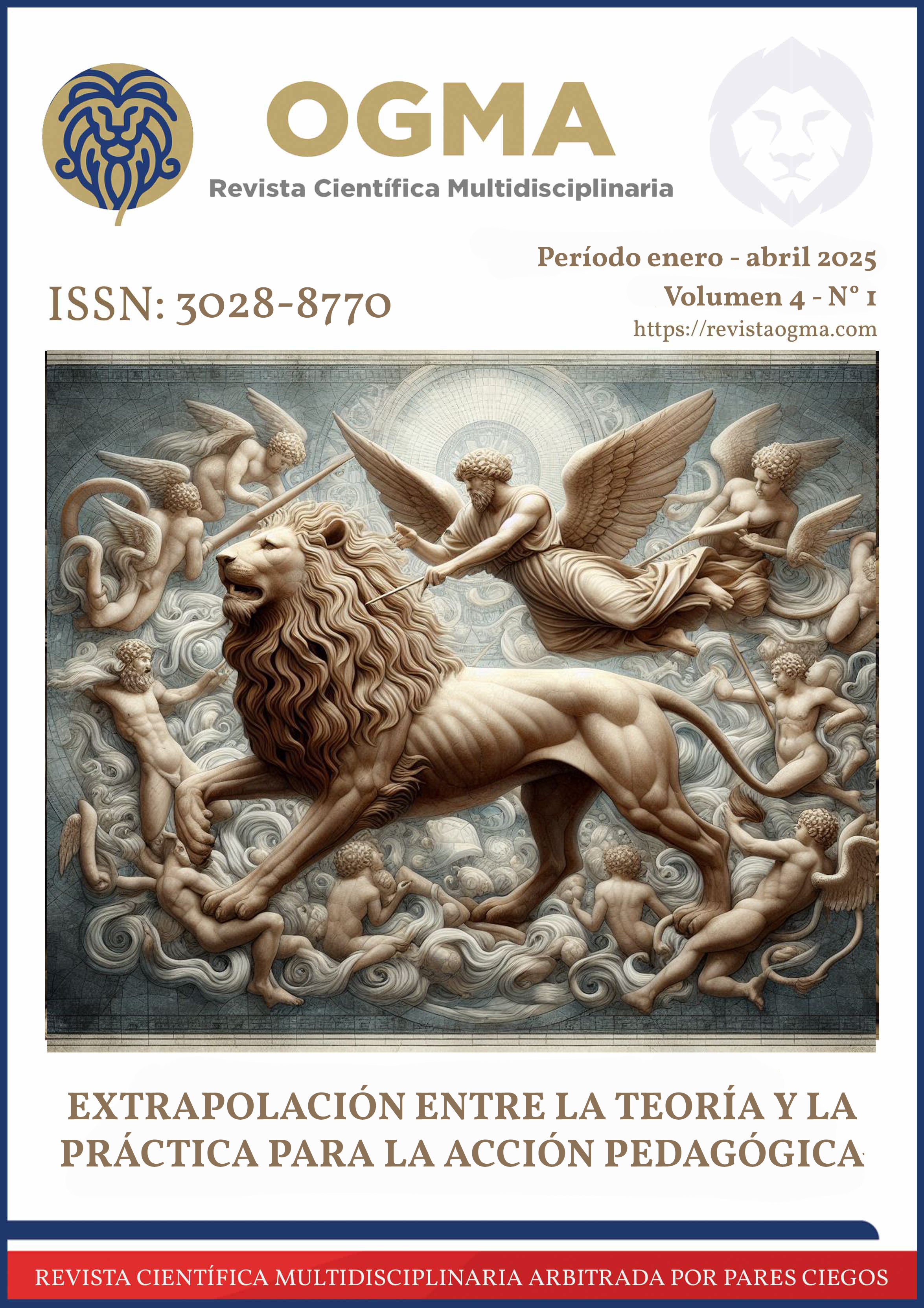Gamification as a teaching-learning strategy in the area of mathematics in elementary education
DOI:
https://doi.org/10.69516/ydhybf45Keywords:
Gamification, Educational strategies, Mathematics teachingAbstract
The objective of this research was to analyze the effectiveness of gamification as a teaching strategy in mathematics for elementary education. The study, with a quantitative approach and experimental design, included 107 tenth grade students from a public institution, divided into experimental and control groups. Data were collected through a satisfaction survey with the gamification methodology and a pedagogical test on first degree equations. The descriptive statistical analysis showed that 50% of the students reported good satisfaction with gamification and 35.19% rated their learning as good. Although motivation was regular for 42.59%, the same percentage evaluated positively the evaluations made. The experimental group obtained better ratings than the control group, showing significant improvements in learning. It is concluded that gamification generates a positive perception, highlighting the students' satisfaction and effective learning. However, the need to strengthen motivation, a key aspect in learning, was identified. Gamification is validated as an effective strategy in mathematics, promoting dynamic and participatory learning, although it requires adjustments to maximize its impact.
Downloads
References
Aguilera Meza, C. K., Santos Loor, C. P., Pinargote Párraga, B. A., & Erazo Delgado, J. R. (2020). Gamificación: estrategia didáctica motivadora en el proceso de enseñanza aprendizaje del primer grado de educación básica. Revista Cognosis, 5(2), 51–70. https://doi.org/10.33936/cognosis.v5i3.2083 DOI: https://doi.org/10.33936/cognosis.v5i3.2083
Bernal Párraga, A. P., Haro Cedeño, E. L., Reyes Amores, C. G., Arequipa Molina, A. D., Zamora Batioja, I. J., Sandoval Lloacana, M. Y., & Campoverde Duran, V. D. R. (2024). La Gamificación como Estrategia Pedagógica en la Educación Matemática. Ciencia Latina Revista Científica Multidisciplinar, 8(3), 6435-6465. https://doi.org/10.37811/cl_rcm.v8i3.11834 DOI: https://doi.org/10.37811/cl_rcm.v8i3.11834
Cangalaya-Sevillano, L., Casazola-Cruz, O., & Farfán, J. (2022). Gamificación en el proceso de enseñanza y aprendizaje de estudiantes universitarios. Horizontes Revista de Investigación en Ciencias de la Educación, 6(23), 637-647. https://doi.org/10.33996/revistahorizontes.v6i23.364 DOI: https://doi.org/10.33996/revistahorizontes.v6i23.364
Caraballo Padilla, Y. Y. (2023). Gamificación educativa y su impacto en la enseñanza y aprendizaje del idioma inglés: un análisis de la literatura científica. Ciencia Latina Revista Científica Multidisciplinar, 7(4), 1813-1830. https://doi.org/10.37811/cl_rcm.v7i4.7011 DOI: https://doi.org/10.37811/cl_rcm.v7i4.7011
Cenich, Gabriela, Araujo, Sonia, & Santos, Graciela. (2020). Conocimiento tecnológico pedagógico del contenido en la enseñanza de matemática en el ciclo superior de la escuela secundaria. Perfiles educativos, 42(167), 53-67. https://doi.org/10.22201/iisue.24486167e.2019.167.59276 DOI: https://doi.org/10.22201/iisue.24486167e.2019.167.59276
Dichev, C., Dicheva, D. (2017). Gamifying education: what is known, what is believed and what remains uncertain: a critical review. International Journal of Educational Technology in Higher Education, 14(9). https://doi.org/10.1186/s41239-017-0042-5 DOI: https://doi.org/10.1186/s41239-017-0042-5
Hidalgo Mariño, D. del R., Rosero Morales, E. del R., Carvajal Molina, C. L., Núñez Aguilar, M. del C., & Ron Moreta, C. F. (2024). Técnicas de gamificación para el desarrollo de destrezas de identificación de figuras geométricas básicas en el nivel inicial. LATAM Revista Latinoamericana De Ciencias Sociales Y Humanidades, 5(3), 2018 – 2038. https://doi.org/10.56712/latam.v5i3.2176 DOI: https://doi.org/10.56712/latam.v5i3.2176
Holguín García, F. Y., Holguín Rangel, E. G., & García Mera, N. A. (2024). Gamificación en la enseñanza de las matemáticas: una revisión sistemática. Telos: Revista De Estudios Interdisciplinarios En Ciencias Sociales, 22(1), 62-75. https://doi.org/10.36390/telos221.05 DOI: https://doi.org/10.36390/telos221.05
Lee, J. Y., Pyon, C. U., & Woo, J. (2023). Digital twin for math education: A study on the utilization of games and gamification for university mathematics education [. Electronics, 12(15), 3207. https://doi.org/10.3390/electronics12153207 DOI: https://doi.org/10.3390/electronics12153207
Liu, Q. (2023). Gamificación en la enseñanza de las matemáticas en la escuela primaria. Revista de Educación, Humanidades y Ciencias Sociales, 22, 428-433. https://doi.org/10.54097/ehss.v22i.12493 DOI: https://doi.org/10.54097/ehss.v22i.12493
López P, Rodrigues-Silva J, Alsina Á. (2021). Brazilian and Spanish Mathematics Teachers’ Predispositions towards Gamification in STEAM Education. Education Sciences. 20 11(10), 618. https://doi.org/10.3390/educsci11100618 DOI: https://doi.org/10.3390/educsci11100618
Meza-Mendoza, Y. G., & Gallegos-Macías, M. R. (2021). Uso creativo de las TICS en el desarrollo de las destrezas matemáticas. Revista Científica Multidisciplinaria Arbitrada Yachasun, 5(9), 105–118. https://doi.org/10.46296/yc.v5i9edespsoct.0114 DOI: https://doi.org/10.46296/yc.v5i9edespsoct.0114
Morocho Palacios, H. F., Cuenca Cumbicos, K. M., & Tapia Peralta, S. R. (2023). El impacto de la gamificación en la motivación y el aprendizaje de los estudiantes de matemáticas de educación básica superior. Ciencia Latina Revista Científica Multidisciplinar, 7(3), 6494-6505. https://doi.org/10.37811/cl_rcm.v7i3.6650 DOI: https://doi.org/10.37811/cl_rcm.v7i3.6650
Núñez Cheng, J. (2021). Tecnologías de la Información y Comunicación en el Desarrollo de las Competencias Matemáticas en la Educación Virtual Universitaria. Ciencia Latina Revista Científica Multidisciplinar, 5(3), 2908-2930. https://doi.org/10.37811/cl_rcm.v5i3.497 DOI: https://doi.org/10.37811/cl_rcm.v5i3.497
Plaza-Paredes, S. N., Plaza-Macías, N., & De-La-Peña-Consuegra, G. (2023). La gamificación para el fortalecimiento del aprendizaje metacognitivo en la asignatura de matemática en estudiantes del subnivel Básico Superior. MQRInvestigar, 7(4), 2966–2983. https://doi.org/10.56048/MQR20225.7.4.2023.2966-2983 DOI: https://doi.org/10.56048/MQR20225.7.4.2023.2966-2983
Zambrano-Álava, A. P., Lucas-Zambrano, M. D., Luque-Alcívar, K. E., & Lucas-Zambrano, A. T. (2020). La Gamificación: herramientas innovadoras para promover el aprendizaje autorregulado. Dominio De Las Ciencias, 6(3), 349–369. https://doi.org/10.23857/dc.v6i3.1402 DOI: https://doi.org/10.35381/e.k.v3i5.847
Downloads
Published
Issue
Section
License
Copyright (c) 2025 Multidisciplinary Scientific Journal Ogma

This work is licensed under a Creative Commons Attribution-NonCommercial-ShareAlike 4.0 International License.












